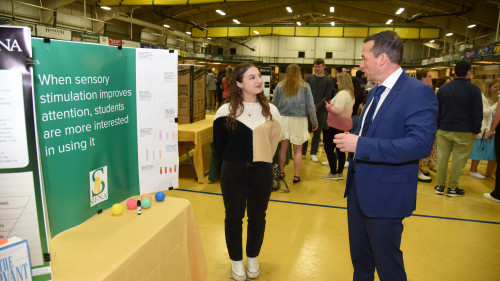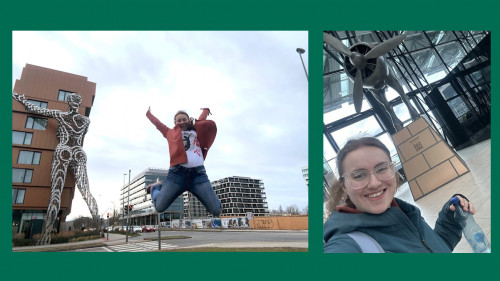
By Mary Barrett '14
What if there was a class that allowed you to program robots that could do everything from pour coffee to make change? Here at Siena, there is.
Students in Assistant Professor of Computer Science Sharon Small, Ph.D.’s computer science class gained hands-on experience creating robots that could perform tasks on command. Their creations were the stars of this year’s RoboShow, sponsored by the Computer Science Department and Institute for Artificial Intelligence.
Students in Small’s robotics course spent the fall semester creating these robots. Instead of traditional lectures, students participated in tutorials. They agreed that the interactive experience helped them better understand how to execute the coding they used to bring their robots to life.
“If we were just sitting in a class being lectured, it wouldn’t work,” said Garrett Allen ’16. Fellow computer science major and classmate Ryan Martin ’15 agreed, adding that thanks to this approach, students were “able to produce a robot that actually does something.” Allen and Martin’s created the “Barista Bot.” Their robot was able to take a person’s coffee order, select the appropriate K-Cup and put it into a Keurig machine.
Computer science majors Andrew Reynolds ’15 and Kevin Mango ’15 designed a “Robo Cashier” that was able to scan grocery items, tell customers their total cost and give them the appropriate change.
Other robots were on the move.
Mathematics education major Sal Baisley ’15 and computer science major David Afrifa ’16 used a left-hand algorithm that allowed their “A-maze-ing Robot” to navigate its way through a floor maze. Computer science majors Ryan Clancy ’15, Blake Edwards ’16 and Kathleen Rotondo ’15 worked together swimmingly to develop “The Ugly Duckling Bot,” which followed its owners by recognizing red in its line of vision and moving toward it.
Small said that this course is one of the heaviest hardware courses offered at Siena. During the semester, students learn a program called Linux and then put the programming skills that they’ve been working on to use. “These challenges help them to grow as strong programmers,” she said.
People who saw the handiwork of Small’s students in action were certainly impressed. Professor of Social Work Carla Sofka, Ph.D. was most captivated by the student’s ability to overcome the challenges presented by their robots. One group was experiencing minor difficulties but they were immediately able to fix it. Their robot then did a perfect job performing its task. “They know how to problem solve and it’s really a testament to their knowledge,” Sofka said. “It’s great when everything works, but to be able to fix it when it’s not working is really impressive.”
Whether seeing a robot complete a maze, make perfect change, follow its owner or make coffee, the hard work of student programmers was really pouring out of these projects. Students developed knowledge and gained experience that will prepare them for future success working with robots and programming computers, and that intelligence is anything but artificial.
The RoboShow was featured on the Times Union's Schools blog.





